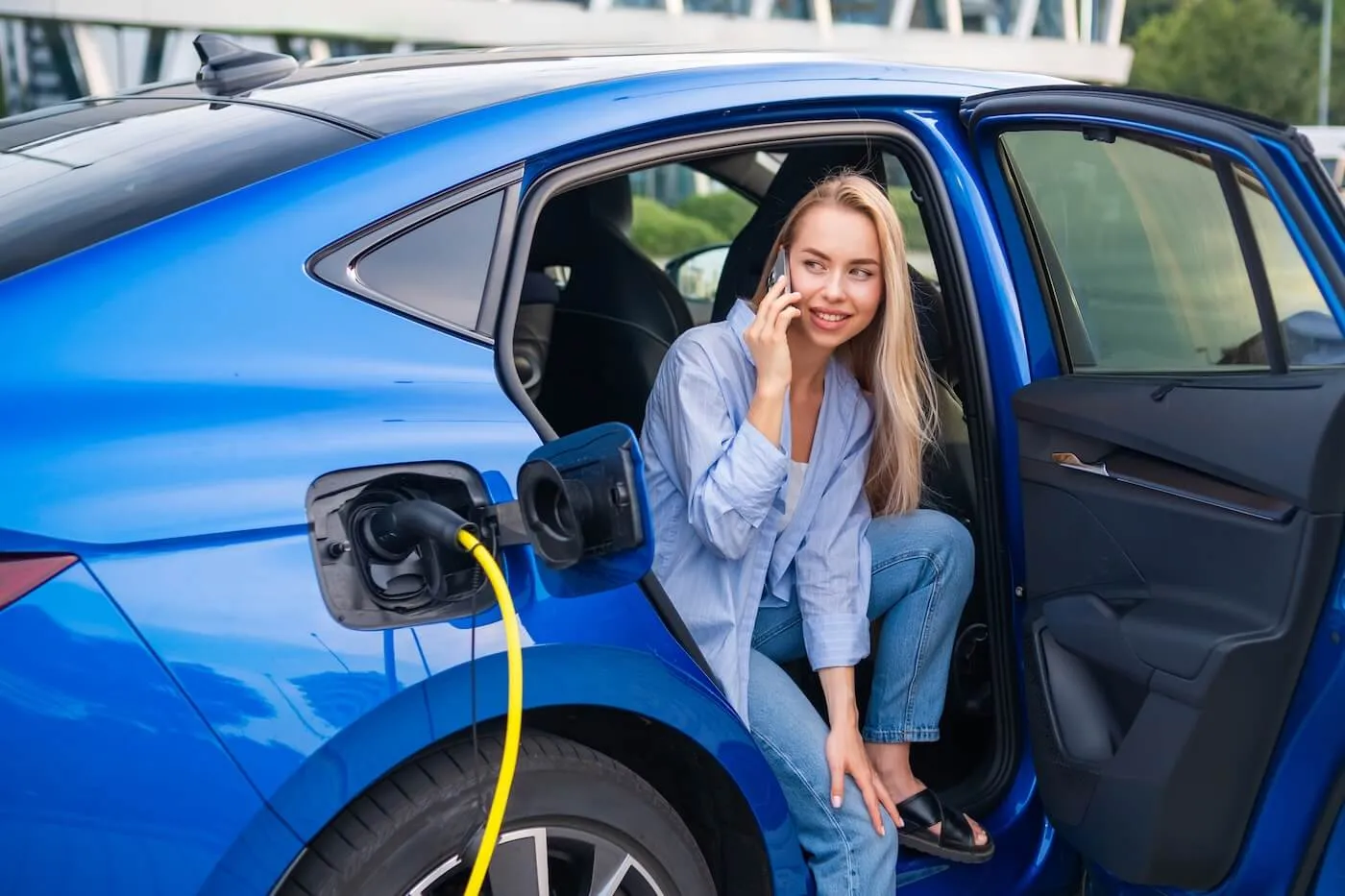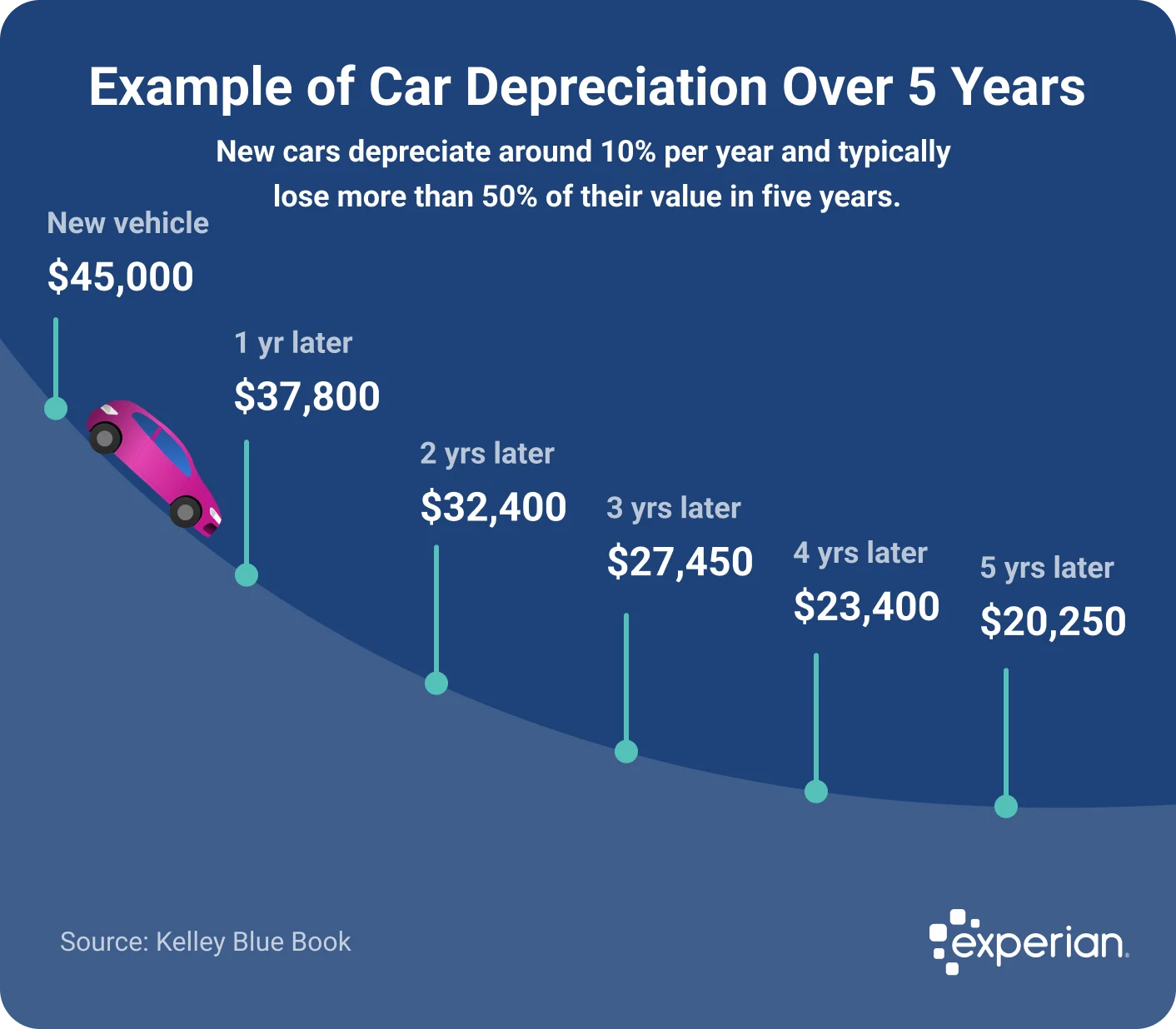How Much Do Cars Depreciate per Year?
Quick Answer
New cars lose an average of 16% in value during the first year and another 12% during the second year. By the end of year five, new vehicles have just 45% of their original value.

Most new cars lose value over time due to everyday wear and tear and aging. This depreciation can be significant at first, with an average of more than 10% in lost value in the first month alone.
While the depreciation rate slows over time, the average car will have less than half of its original value after five years. The good news is that some models hold their value better than others. Learning about how cars depreciate can help you determine the right vehicle for you.
How Much Do New Cars Depreciate Per Year?
New cars depreciate around 10% per year and lose more than 50% of their value after five years. Here's a look at how the average car depreciates over the first five years of its life, assuming an average starting value of $45,000:
| Year | Depreciation Rate | Residual Value | Dollar Loss |
|---|---|---|---|
| 1 | 16% | 84% | $7,200 |
| 2 | 12% | 72% | $5,400 |
| 3 | 11% | 61% | $4,950 |
| 4 | 9% | 52% | $4,050 |
| 5 | 7% | 45% | $3,150 |
Source: Kelley Blue Book

What Factors Affect Car Depreciation?
While the average depreciation rate can give you a good idea of what to expect, there are several factors that will influence how your new vehicle will lose value over time:
- Mileage: Americans drive an average of 13,476 miles per year, according to the Federal Highway Administration. If you tend to drive more than that, you may face expensive repairs sooner than other drivers, resulting in a faster depreciation rate.
- Condition: The more wear and tear your vehicle sustains, the faster it will depreciate. For example, if you use your vehicle for off-roading, it'll likely lose value more quickly compared to someone who uses the same model for commuting.
- Reliability: Vehicles with better reliability ratings need fewer repairs and are more likely to hold their value over time.
- Service history: Sticking to your vehicle's maintenance schedule is crucial for minimizing repairs down the road. A car that's well maintained will hold its value better than one that isn't.
- Desirability: Ultimately, the value of your vehicle is based on what others are willing to pay for it. If you buy a model that doesn't have a lot of demand, it may not hold its value well.
- Warranty status: An active manufacturer's warranty or even an extended warranty can help a vehicle retain its value because it helps minimize risks for potential buyers.
Compare rates on auto refinance
Find a good auto refinance loan with today’s rates. Compare current rates and offers to find the best loan for you.
What Cars Depreciate the Slowest?
Toyota has consistently produced vehicles with great resale value, earning the best brand title eight out of the last nine years, according to Kelley Blue Book. For luxury cars, Lexus offers the best resale value.
Electric vehicles typically depreciate faster than gas-powered cars, primarily due to upfront tax credits and innovations that make older models obsolete. However, that trend is changing.
Luxury vehicles also tend to depreciate more quickly, often due to high starting prices and lower demand for used models.
Here's a look at the models with the best resale value in 2025:
| Car Model | 5-Year Residual Value |
|---|---|
| Toyota Tacoma | 64.1% |
| Chevrolet Corvette | 61% |
| Toyota Tundra | 60.9% |
| Toyota 4Runner | 60% |
| Ford Bronco | 57% |
Source: Kelley Blue Book
What Cars Depreciate the Quickest?
As you might have guessed, luxury and electric cars make up most of the models that depreciate the fastest. While that might not be a deal breaker for some who generally prefer those types of vehicles, it's still something to keep in mind as you shop around.
Here's a look at the models with the worst resale value after five years:
| Car Model | 5-Year Residual Value |
|---|---|
| Jaguar I-PACE | 27.8% |
| BMW 7 Series | 32.9% |
| Tesla Model S | 34.8% |
| Infiniti QX80 | 35% |
| Maserati Ghibli | 35.3% |
Source: iSeeCars
How to Tell How Much Your Car Is Worth
If you're thinking about selling your car, trading it in or refinancing it to tap some of your equity, there are a few ways you can get an estimate of its value:
- Use an online valuator. Websites like Kelley Blue Book and J.D. Power offer valuation tools you can use to gauge your vehicle's trade-in and resale value. Simply provide some basic details about your car, such as its condition, features and mileage, and you'll get a range of values to inform your decisions.
- Get a quote. Dealerships are often looking for used cars to snap up and resell, especially if your model is in demand. Check with local dealers to see if you can get a quote for what they'd offer you. The more quotes you get, the better your odds of securing the best possible deal.
- Compare it to similar used cars. You may also consider checking local classifieds to see what others are selling their cars for. Just keep in mind that you'll need to try to match your vehicle's details as closely as possible to get the best estimate.
Learn more: How to Sell Your Car for the Most Money Possible
How Can I Slow My Car's Depreciation?
Regardless of how your car loses value compared to other models, you can take steps to minimize the impact of depreciation and maximize your resale value:
- Maintain your vehicle. Remember, keeping up with your scheduled maintenance is crucial for minimizing costly repairs and maintaining your resale value.
- Limit mileage. If possible, try to limit driving your car unnecessarily. Limiting your mileage can help keep your car in good condition.
- Drive safely. Rapid acceleration and braking, taking turns fast, driving on rough roads and overloading your vehicle can all contribute to more wear and tear over time. Being more gentle on your vehicle can help keep its value.
- Avoid customizations. Customizing your car with aftermarket parts limits the potential demand when you're ready to sell. Lower demand often translates to lower resale value.
- Repair with original parts. If you get in an accident or need repairs for other reasons, make sure you use a certified mechanic who uses original equipment manufacturer (OEM) parts.
When you're ready to sell your car, consider selling it to a private buyer rather than trading it in. Selling it privately generally gives you a better price because, unlike dealers, private buyers aren't planning to turn around and sell the car for a profit.
Learn more: How to Protect Your Car's Value
The Bottom Line
When considering a new car purchase, it's important to learn about how depreciation can impact your vehicle's resale value. This is especially important if you like to get a new car every few years or so.
While some models lose value faster than others, you can take certain steps to minimize the impact of depreciation. Researching your options and comparing different models can help you find the right vehicle for you.
Depreciation is just one factor to consider when budgeting for a new car. Learn more about auto loan rates and the average cost of car insurance to better understand the total cost of owning a car.
What makes a good credit score?
Learn what it takes to achieve a good credit score. Review your FICO® Score for free and see what’s helping and hurting your score.
Get your FICO® ScoreNo credit card required
About the author
Ben Luthi has worked in financial planning, banking and auto finance, and writes about all aspects of money. His work has appeared in Time, Success, USA Today, Credit Karma, NerdWallet, Wirecutter and more.
Read more from Ben